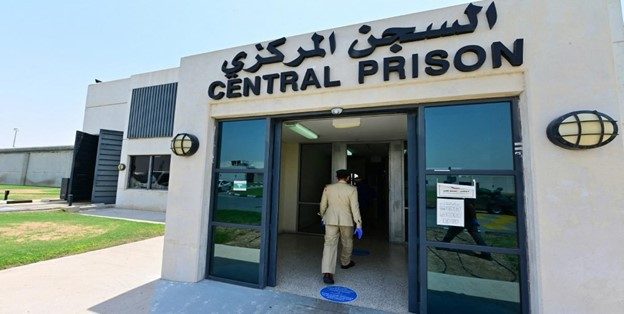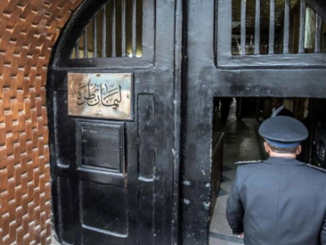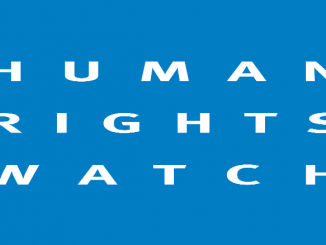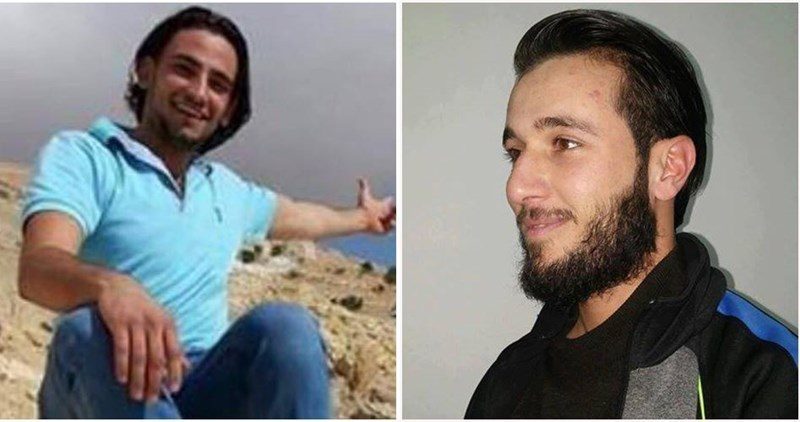
“Expo 2020 is yet another opportunity for the UAE to falsely present itself on the world stage as open, tolerant, and rights-respecting while shutting down the space for politics, public discourse, and activism,” says Michael Page, deputy Middle East director at HRW
In a joint letter published on October 1, 76 organizations appealed to the UAE to uphold the 2020 Dubai Expo’s motto of “sustainability, mobility, and opportunity” by releasing all imprisoned human rights defenders.
The letter highlights the gross mistreatment and unjust detention of the “UAE-94,” including human rights activist Ahmed Mansoor—who serves on the advisory board of the Gulf Centre for Human Rights (GCHR)—economist Nasser bin Ghaith, and human rights lawyer Mohammed al-Roken, all of whose releases were demanded in a resolution passed by the European Parliament last month.
On September 17, the European Parliament passed a resolution criticizing the “systematic persecution of human rights defenders” and intensifying “crackdown on freedom of association, assembly, and expression” in the UAE.
The resolution, which received 383 votes in support and only 47 against, demands the immediate release of imprisoned activists Ahmed Mansoor, Mohammed al-Roken, and Nasser bin Ghaith.
In addition to taking particular issue with the abhorrent state of Mansoor’s imprisonment, the resolution also notes the UAE’s violations of the rights of women, foreign workers, and prisoners.
It furthermore urges EU member states and potential international sponsors to boycott the upcoming Dubai Expo 2020 “in order to signal their disapproval of the human rights violations in the UAE.”
Speaking at the Expo, former UN High Commissioner for Human Rights Mary Robinson urged authorities to release Mansoor, who she said “is regarded by the human rights community as a brave human rights defender” and whose release “would be a timely move” in light of the European Parliament resolution.
Prior to publishing the letter, GCHR, POMED, and 23 other human rights organizations launched the Alternative Human Rights Expo to “counter the narrative of ‘tolerance’ and ‘openness’ that the UAE claims to uphold and aims to feature at the Dubai Expo, and highlight the repression still happening in the country.”
What the Dubai Expo really covers up
From 1st October 2021 to March 2022, the UAE is hosting the Dubai Expo, the first World Expo to be held in the Arab World. The event will explore the issues of sustainability, mobility and opportunity. The country claims that when the world comes together, we create a better tomorrow.
But coming together to hear diverse voices and create a better world isn’t possible when you lock up people for speaking their minds. In the UAE, every single human rights defender has been exiled or imprisoned in violation of their right to freedom of expression. Not one of them has been invited to the Dubai Expo.
Over 20 human rights partners* are launching a campaign to counter the narrative of “tolerance” and “openness” that the UAE claims to uphold and aims to feature at the Dubai Expo, and highlight the repression still happening in the country.
Tolerance narrative a sham
Human Rights Watch (HRW) similarly accused the UAE of using the Expo to promote a false image of itself. Michael Page, deputy Middle East director at HRW, stated, “Expo 2020 is yet another opportunity for the UAE to falsely present itself on the world stage as open, tolerant, and rights-respecting while shutting down the space for politics, public discourse, and activism.”
HRW said the UAE authorities use Expo 2020 Dubai to promote a public image of openness that is at odds with the government’s efforts to prevent scrutiny of its rampant systemic human rights violations, Human Rights Watch said today. Expo 2020 is a prominent global cultural event built on the free exchange of ideas.
Domestic critics are routinely arrested and, since at least 2015, UAE authorities have ignored or denied requests for access to the country by United Nations experts, human rights researchers, and critical academics and journalists. The government’s pervasive domestic surveillance has led to extensive self-censorship by UAE residents and UAE-based institutions; and stonewalling, censorship, and possible surveillance of the news media by the government.
“Dozens of UAE peaceful domestic critics have been arrested, railroaded in blatantly unfair trials, and condemned to many years in prison simply for trying to express their ideas on governance and human rights,” said Michael Page, deputy Middle East director at Human Rights Watch. “Expo 2020 is yet another opportunity for the UAE to falsely present itself on the world stage as open, tolerant, and rights-respecting while shutting down the space for politics, public discourse, and activism.”
Expo 2020 will be held from October 1, 2021, to March 31, 2022, with the theme, “Connecting Minds, Creating the Future.” The Bureau International des Expositions, the intergovernmental organization overseeing Dubai Expo 2020, said that the theme is “based on the belief that bringing the world together can catalyze an exchange of new perspectives.” The event was postponed to 2021 due to the coronavirus pandemic.
This event, as with other expensive entertainment, cultural, sports, and educational events before it, is designed to promote a public relations image of the UAE as an open, progressive, and tolerant country while its abusive authorities forcefully bar all peaceful criticism and dissent, Human Rights Watch said. Earlier last month, the European Parliament urged states not to take part in the Expo, citing human rights abuses, the jailing of activists and the government’s use of spyware to target critics.
Since 2011 UAE authorities have carried out a sustained assault on freedom of expression and association, arresting and prosecuting hundreds of independent lawyers, judges, teachers, students, and activists, and shutting down key civil society associations and the offices of foreign organizations, effectively crushing any space for dissent. The UAE also introduced new laws and amended already repressive ones to further suppress freedom of expression to more easily stamp out dissent.
Local news sites, many of which are owned or controlled by the state, exercise self-censorship in accordance with government regulations and unofficial red lines. Foreign journalists and academics say their organizations may exercise self-censorship for fear of denial of entry or deportation.
The government has also prevented UN experts, human rights researchers, and others from scrutinizing its human rights record on the ground. Since 2014, when the UN special rapporteur on the independence of judges visited the UAE and published a damning report criticizing the country’s lack of judicial independence, the government has rebuffed most requests by UN human rights experts to visit.
Major international human rights organizations, including Human Rights Watch and Amnesty International, have also faced increased restrictions on their ability to visit and engage with government officials on human rights issues. Staff of both organizations were refused access to prisons and high-profile trials, and eventually admission to the country. UAE authorities have rarely responded to either organization’s requests for information or meetings.
And since at least 2011, UAE authorities have also haphazardly barred entry to academics, writers, artists, and journalists, some for their criticism of the UAE’s mistreatment of migrant workers, and others often without any stated justification.
The UAE has embarked on a decades-long effort to whitewash its reputation on the international stage. These efforts were made explicit in the government’s 2017 Soft Power Strategy, which includes cultivating “cultural and media diplomacy” as a central pillar and has a stated objective “to establish [the UAE’s] reputation as a modern and tolerant country that welcomes all people from across the world.”
Expo 2020 is the latest in a long list of investments in ambitious cultural and educational projects that seek to further that goal, Human Rights watch said. Others include the acquisition of the Louvre, the Guggenheim, and New York University outposts, establishing Dubai as a luxury tourism destination, and hosting global cultural events such as the 2019 Special Olympics in Abu Dhabi and the upcoming World Expo in Dubai.
While leading international academic and cultural institutions first established a presence in the UAE with the promise to serve the public good by promoting “ideas, discourse, and critical thinking,” they have since remained silent in the face of increasing repression of basic rights. They operate in the UAE even at the expense of academic freedom and the right to free expression within their own spaces.
Especially over the past few years, the UAE government has dramatically scaled up its surveillance capabilities, both online and through mass monitoring of physical spaces, prompting experts to list Abu Dhabi and Dubai among the world’s most closely surveilled cities.
Websites, blogs, chat rooms, and social media platforms are also heavily monitored and curtailed. The authorities block and censor content online that they perceive to be critical of the UAE’s rulers, its government, its policies, and any topic, whether social or political, that authorities may deem sensitive. Virtual private networks (VPNS) are criminalized. Citizens and residents face heavy fines and imprisonment for social media posts.
UAE authorities have also spied on international journalists, activists, and even world leaders using sophisticated Israeli and EU-produced spyware, or with the help of former US intelligence officials. Some of those whose communications and devices were targeted by the government surveillance and who are residents of the UAE, were subsequently arrested and abused in detention.
Among them is the prominent Emirati human rights activist Ahmed Mansoor. A UAE court sentenced Mansoor to 10 years in prison in May 2018 following a grossly unfair trial, partly based on private email exchanges and WhatsApp conversations. A 2016 Citizen Lab report demonstrated five other cases where arrests or convictions of users followed malware attacks against their Twitter accounts from 2012 to 2015.
This repressive environment, coupled with the authorities’ use of advanced spyware to target anyone deemed a threat to the country, has led citizens, residents, and even journalists, academics, businessmen, and others who frequent the UAE to warily restrict their public criticism of the authorities. As one journalist said about their office based in Dubai, “The head of office is shit scared of the authorities … There is a practice of holding back stories if they can’t get official comment – which they often can’t. They don’t go hard on the UAE.”
“With widespread arrests, intimidation, surveillance, and retaliation that citizens and residents face for speaking out, Expo participants and other countries should raise concerns about rights abuses in the UAE,” Page said. “Countries participating in the expo should ensure that they are not helping the UAE whitewash its image and obscure its abuses,” stated the HRW.



